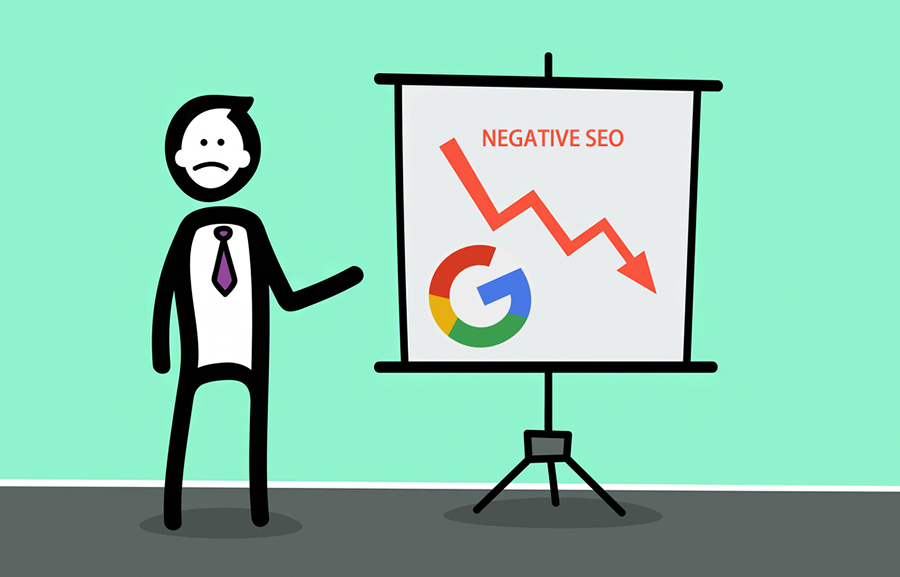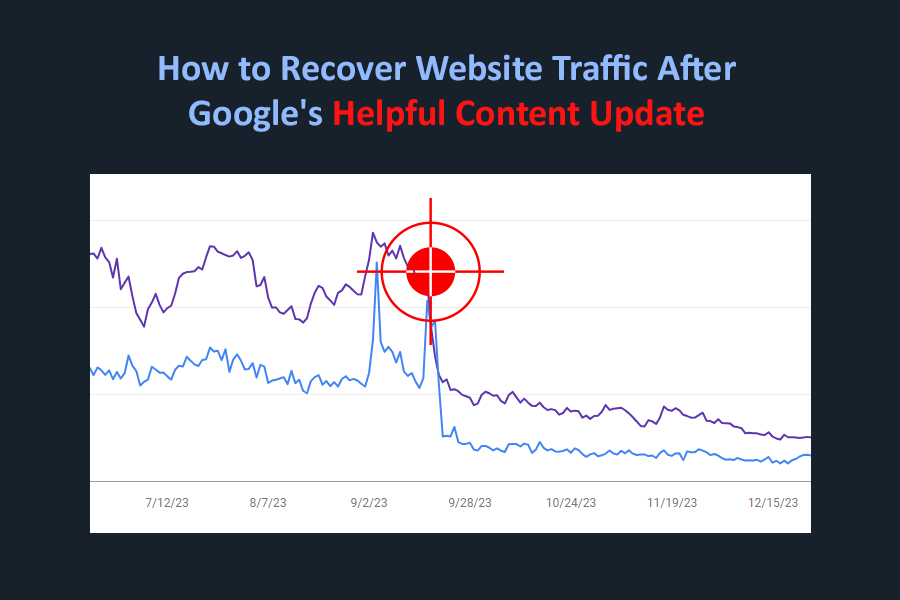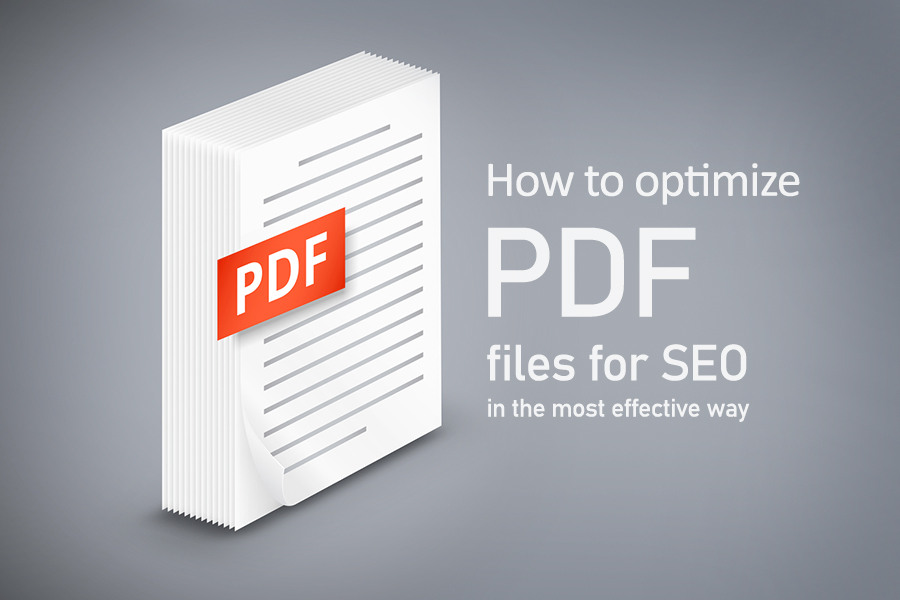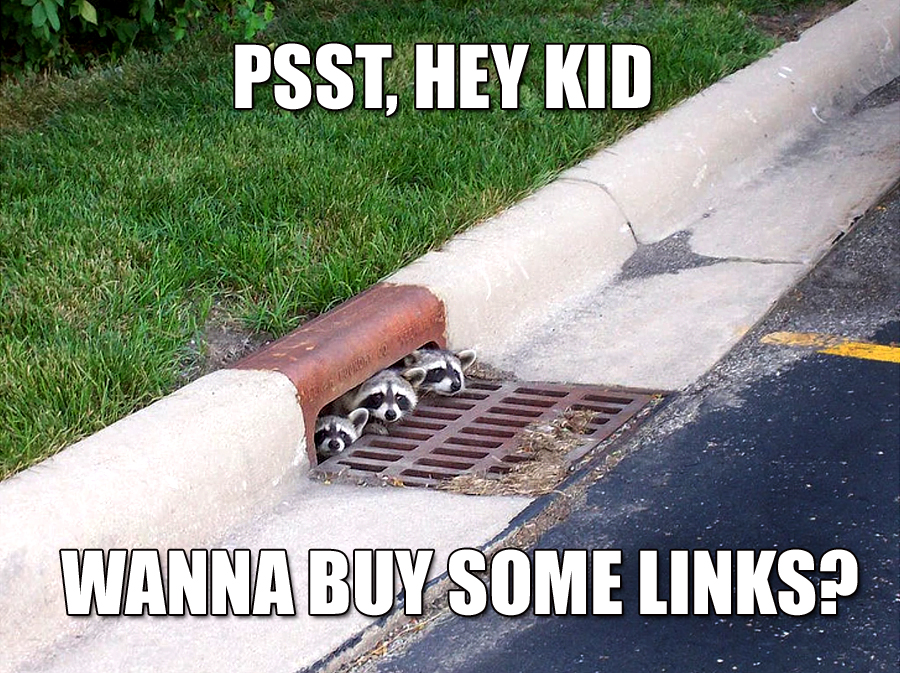
Lately, cases about successful SEO have been especially popular. Undeniably, this motivates us to strive for excellence and reach new heights, but how beneficial is it from a practical standpoint?
This article aims to do the exact opposite. It's here to discuss SEO mistakes and warn you about what not to do and why.
In this article, you won't encounter such trivial errors like: lack of a Sitemap, incorrect robots.txt file, unoptimized images, etc. – only those SEO mistakes that even advanced SEO specialists with years of experience in website promotion sometimes commit.
So, here are 10 SEO mistakes even experienced SEO experts can fall prey to.
1. Even more backlinks, any backlinks...
This mistake typically stems from euphoria following success when, after a series of position growth spurts, there's a desire to further amplify this success. Consequently, more backlinks are purchased without paying enough attention to their quality.
Some SEO specialists even resort to buying “high performance links” from serial link sellers' lists, on Fiverr, various link-building forums, and link seller communities...
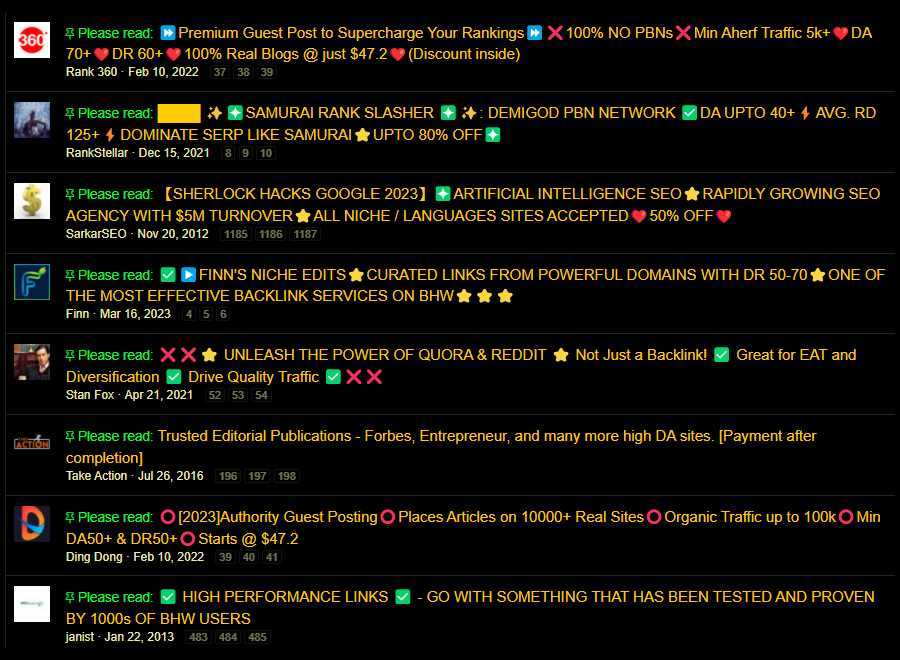
You shouldn't pay attention to high DA or DR. These can be achieved without much difficulty. The same cannot be said for high organic traffic. Remember, thousands of websites are created with one sole purpose - selling backlinks, and links from such websites could have adverse consequences for you.
Initially, the website might respond positively to such backlinks. But later, usually after a Google update, it tends to slump significantly in the search rankings.
Recommendations:
- Prioritize the quality of backlinks over quantity.
- Avoid buying links from dubious websites and suspicious sources.
2. More anchors with exact keyword matches
This situation is similar to the previous one. Over time, it seems like it wouldn't hurt to have more powerful links specifically geared towards search queries. As a result, even more links with exact money anchors are set up.
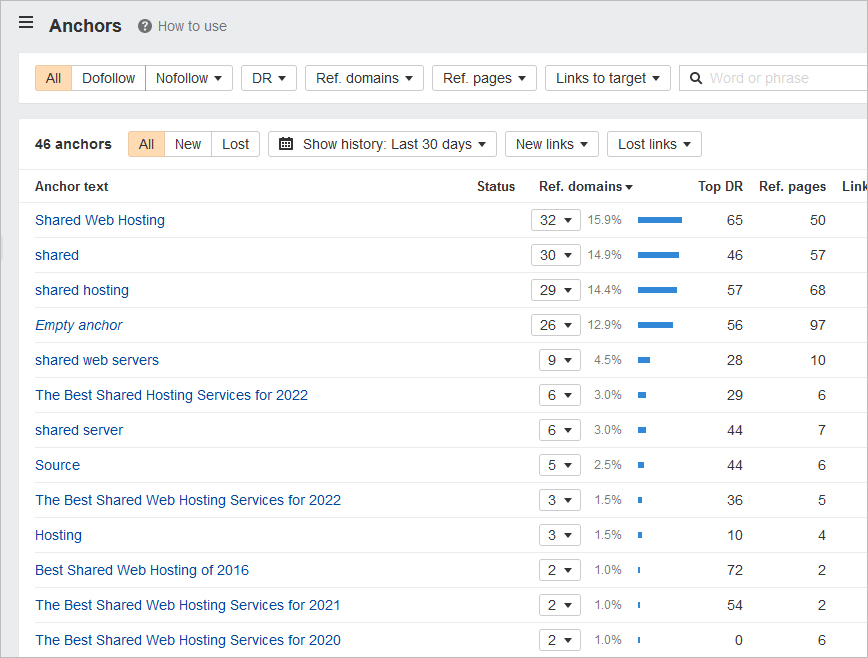
This risks anchor text spam, with all the associated problems. It won't be easy to immediately detect the cause of the problem - Google punishes anchor text spamming by imposing an algorithmic filter. This means that there will be no mention of it in the Search Console.
This is especially relevant to crowd marketing link building – in which case it's wise to mostly use non-anchor backlinks.
Recommendations:
- Over 50% of your links should be non-anchor (the percentage varies depending on the niche).
- When in doubt, it's better to use the page URL itself as the anchor.
3. Replacing all the content on a page
This situation typically arises when you have an informational page with content written several years ago. The page gets organic traffic, but not nearly as much as you'd like.
The SEO specialist decides that the content is outdated and needs a complete rewrite. However, after replacing all the old content with new, the Google traffic decreases even further.
Recommendations:
- In most cases, it's better to rewrite the content in parts, not all at once. The exception is if the page does not have any search traffic at all. But here, the reason might not be the poor content.
- Sometimes, it's more reasonable to simply add to the existing content, provided that the old content has not been copied by other websites.
- If the content has been copied by other websites, it's worth checking Google's attitude towards these pages. If, when searching for a piece of text from your old content (5 - 8 words enclosed in “.””), in the first place in Google is not your page, but another site's page that has reprinted your content, then that section needs to be rewritten.
4. Focusing on technical SEO and forgetting about link building
This is typical for highly competitive niches. It's well-known that Google likes a high number of backlinks. Sometimes, position growth is only possible after a lengthy "bombardment" of the page with hundreds of links.
Some SEO specialists can't understand why their page/site is growing so slowly or not growing at all. hey think that there are technical errors on the site - some deficiencies in the site structure, problems with duplicates, canonical pages, etc. In reality, the cause might be the links. Simply, this niche requires a larger number of backlinks. As new backlinks are established, growth will be noticeable:
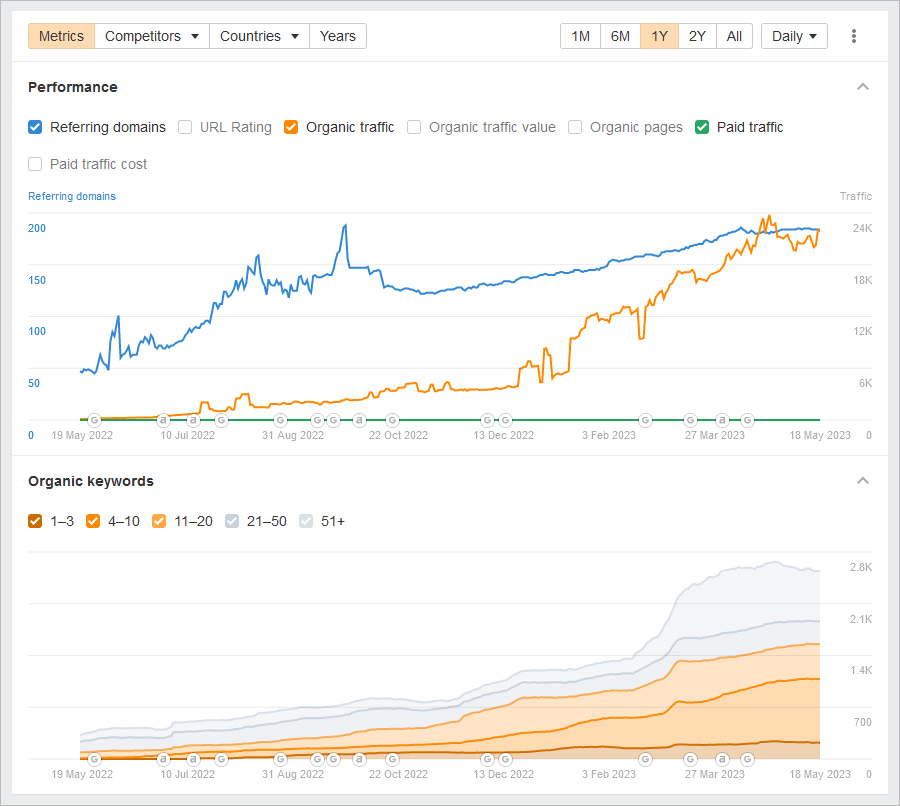
But don't forget the #1 mistake - backlinks should be placed on high-quality and relevant websites.
Recommendations:
- Technical optimization is undoubtedly important, as is the presence of high-quality, well-written content on the site. However, in most cases, without a sufficient number of backlinks, there will be will be no position growth
5. Merging domains of irrelevant niches
Domain merging to the promoted website is an old and relatively effective way to boost a site. Usually, a dropped site is selected, which already has links from other websites. Then this drop is set up with a 301 redirect to the promoted website.
Most often, difficulties can arise in two cases:
1) the drop already has penalties from Google.
2) the drop is irrelevant or barely relevant to your website.
Such a merging operation could worsen your page/site's rankings.
Recommendations:
- Don't merge drops of a different theme than the one you're promoting.
- It's reasonable to first test the drop on other, less critical pages of the website before merging it to promoted pages.
6. Not keeping track of new backlinks to the site
Even top-level SEO experts have been noticed in this. The reason is plain simple – laziness. Typically, new backlinks only get attention after problems start to arise.
What problems? Dishonest competitors might load up your site with garbage links from various dubious websites. Sometimes even with the same anchor text that your site is being promoted with, but in massive quantities - hundreds or even thousands of backlinks.
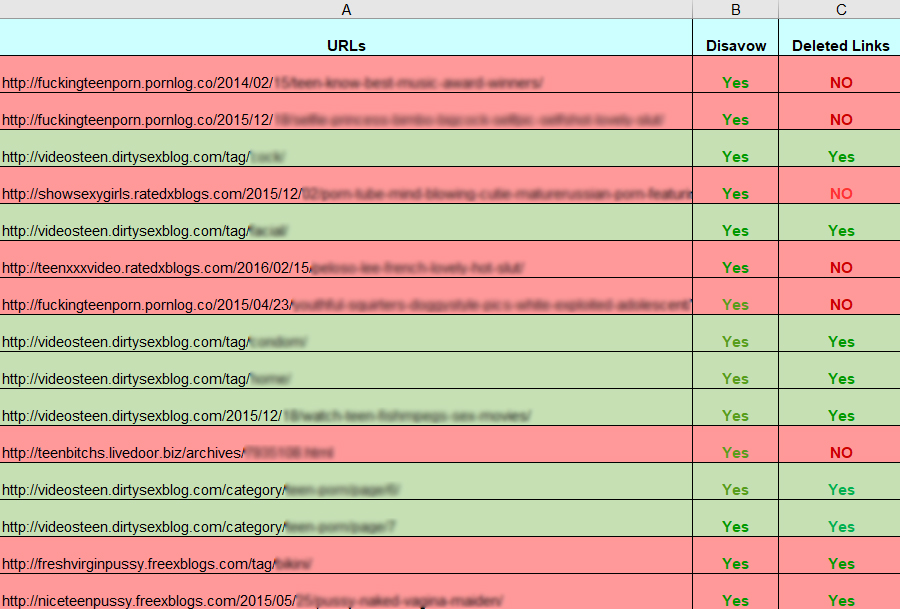
If you don't notice such backlinks in time and don't take any countermeasures, your site can get hit by Google's filters and lose organic traffic. Believe me - this is a not easy situation from which it's difficult, but still possible to find a way out. Find out how we did it in this article: How to Protect Your Website from Negative SEO without Losing Your Positions
Recommendations:
- The more competitive the niche and the closer your website to the top, the more likely this problem becomes.
- Most SEO services like Ahrefs, Moz, and other provide weekly reports on recently emerged backlinks. You can also check new links at any time by specifying the required period.
- Since sometimes competitors hide links from bots of popular SEO services, it's better to additionally use less popular link monitoring services or engage offline backlink parsers.
7. Incorrectly assessing competitors in the niche
The importance of competitor site analysis in modern SEO can hardly be overstated. Usually, one would analyze backlinks (quantity, sources, nofollow/dofollow) and page content (quality of writing, structure, LSI words, text size).
If, for example, only 10 backlinks are set up on a competitor's site, it doesn't mean that achieving the same search position will require only 10 backlinks for you. Or 20, or 100...
The reason isn't just about the value of each individual link. The trustworthiness and authority of websites also matter a great deal. If your competitor is a section/page on a mega-popular website, assessing and literally comparing the number of links and the size of the content will be incorrect.
To show you this, take a look at the link profiles of these three pages. All three are in the top 3 Google for a highly competitive search query: best shared hosting.
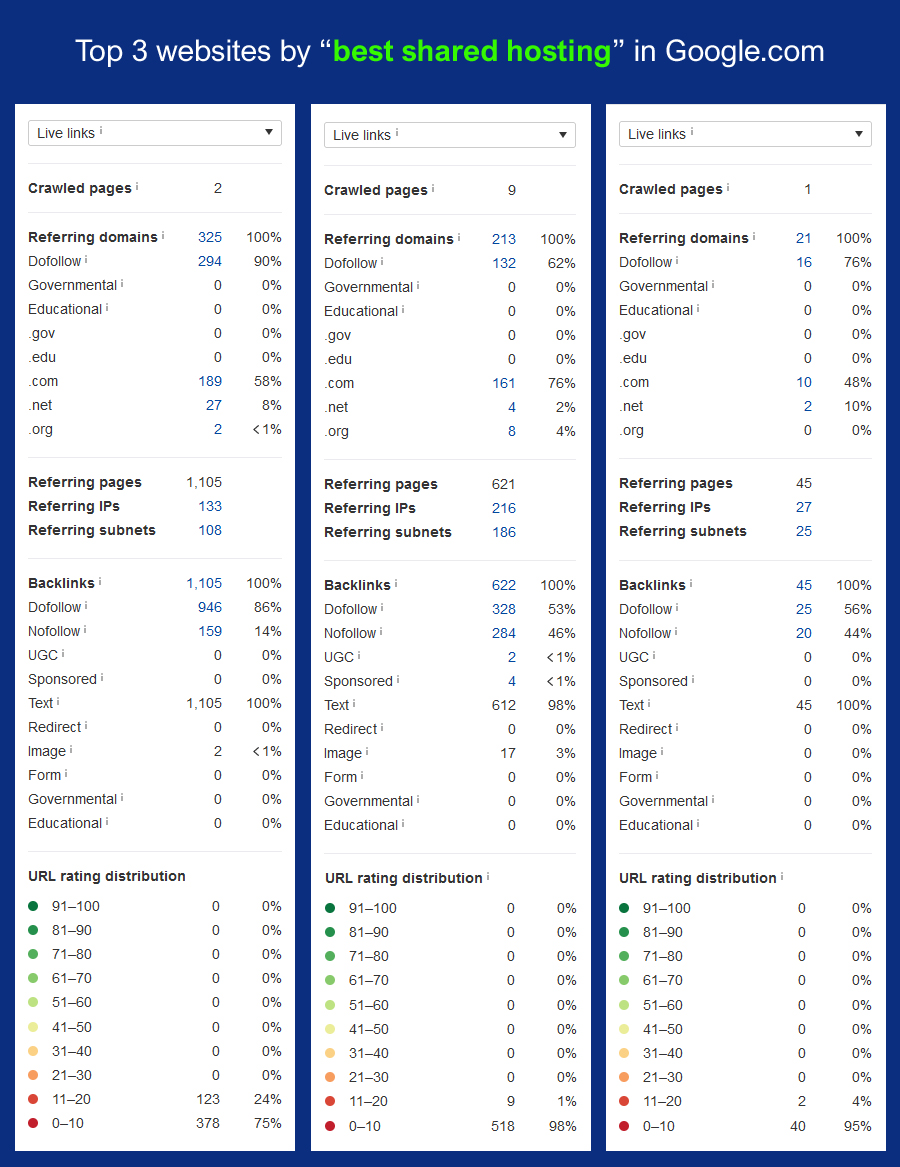
Recommendations:
- Consider the site's conditional trustworthiness as an additional factor. Conditional trustworthiness isn't some synthetic parameter of an SEO service. It's a combination of popularity, traffic, and citation of the site. Typically, such sites have a large percentage of direct traffic. In other words, people willingly visit the Forbes site simply because it's Forbes.
8. Overly detailed semantics and cannibalization of queries
It's well known that a well-crafted semantic core is key to SEO success. It's sensible to divide the site into groups of search queries and promote each separately.
In highly competitive niches, a separate page is created for each low-frequency query. Even micro-frequency queries sometimes get their own pages. But there's a hidden danger here. It lies in the potential cannibalization of queries. This is when Google shows two or more of your website pages for the same query.
Typically, in such a case, none of these pages will make it to the top. The pages simply become competitors to each other, reducing the overall effectiveness of promotion.
Recommendations:
- You should know the niche in which you're promoting the site well enough to create highly specialized pages, but without risking query cannibalization.
- If there's a suspicion that a newly created page might take traffic away from an existing one, it sometimes makes sense to put a link on it with that very anchor. This way, you let Google know which page is the canonical one for that particular search query.
9. Fear of placing dofollow outbound links
This mistake is usually characteristic of old-school SEO professionals. In the early days of SEO, there was a widespread theory about PR leakage from one web page to another through outbound and inbound links. There were even formulas for calculating PR within one page and its outbound and inbound links.
It used to be thought that the more external backlinks led to a page and the fewer references the page itself made to other resources, the more its PR accumulated, which led to increased positions in Google.
And if you can agree with the first part, then categorically not with the second. Moreover, by referencing authoritative sources, you are effectively signaling to Google who the potential audience for this page is and which queries it should be ranked for.
Recommendations:
- If your page's search positions aren't growing even though the page contains current and recently updated content, try placing dofollow links to authoritative sources used in its creation. And of course, don't forget about acquiring new backlinks.
10. Reducing link work after reaching the Top
A long and systematic approach to acquiring backlinks is one of the key factors influencing the achievement of top positions. However, reaching the top isn't enough. It's equally important to stay there.
Some SEO professionals partially or entirely stop adding new backlinks once they reach the top of the search results. In highly competitive niches, this often results in the loss of top positions. It's unfortunate when a website loses the Top after it's reached it.
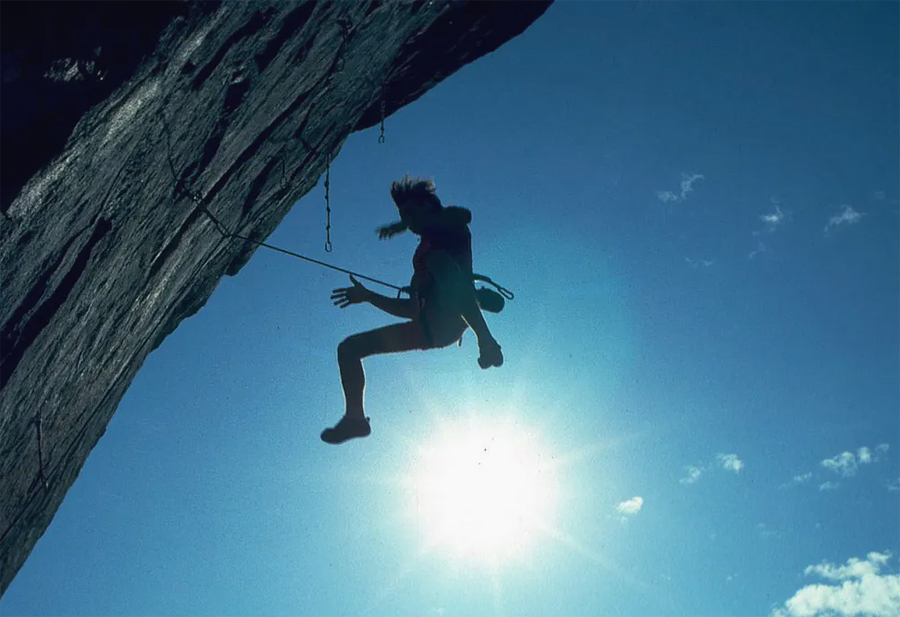
And the reason is your competitors. While you rest on your laurels, your competitors continue to improve content and actively engage in link building. At some point, Google may decide that they deserve to be at the top of the results more than you do.
Recommendations:
- You can reduce the addition of new links upon reaching top positions if you are confident that your competitors stand no real chance of overtaking you. However, it's reckless to completely stop acquiring new links. If there's no natural growth in backlinks, your site/page will eventually lose its achieved positions.

